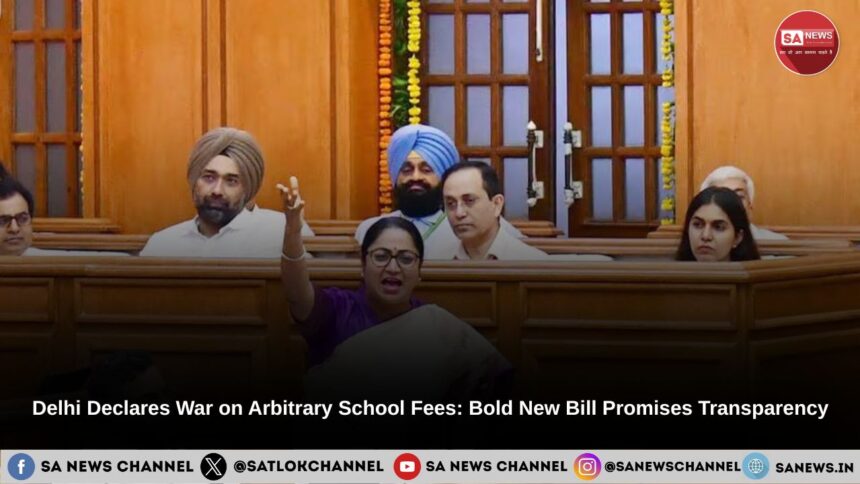In a decisive and bold move to rein in arbitrary fee hikes by private unaided schools, the Delhi Government, led by Chief Minister Rekha Gupta, is set to table a landmark bill in the Monsoon Session of the Delhi Assembly. The legislation aims to restore balance, fairness, and transparency in the capital’s education system where almost 40% of students are enrolled in private schools.
- Why This Bill Was Needed: The Ground Reality
- Key Provisions of the Bill
- Three-Tier System with Parental Involvement
- CM Rekha Gupta’s Vision: Education with Equity
- Delhi Assembly Goes Digital and Sustainable
- Public Response: Support with Cautious Optimism
- What Happens Next
- A Turning Point for Education in Delhi
- Spiritual Insight: The Foundation of a Fair Society Lies in True Knowledge
- FAQs about Delhi’s new fee regulation bill for private schools
The proposed bill is not just a policy move; it is a response to years of grievances from parents and education advocates who have long alleged that private institutions are exploiting their financial autonomy with unchecked annual fee hikes.
Why This Bill Was Needed: The Ground Reality
Over the past few years, multiple schools in Delhi have been found increasing their fees by 15–18% annually, despite already charging six-figure sums. This trend has sparked a growing wave of discontent among parents and civic groups.
The government recognized that while private schools play an undeniably vital role in Delhi’s education landscape, some level of accountability and oversight is essential to protect students and parents from financial exploitation.
Key Provisions of the Bill
The new bill proposes a clear, rule-based structure for schools to follow when revising their fees. Here’s what stands out:
○ Fines for Violations:
- ₹1 lakh to ₹5 lakh for the first offence
- ₹2 lakh to ₹10 lakh for repeat violations
○ Refund Penalties:
If a school is ordered to refund excess fees and fails to do so within the given time:
- The fine doubles after 20 days
- Triples after 40 days
- Continues increasing every 20-day delay
○ Disqualification for Offenders:
Chronic offenders may lose the right to propose fee hikes in the future and face a ban on holding any position in the school management.
Three-Tier System with Parental Involvement
A crucial innovation in this bill is the inclusion of parental representation in the fee decision-making process.
The government plans to introduce a three-tiered fee committee system, with parents present at the first two levels. This ensures that those most affected by fee hikes, the parent, finally have a voice and a seat at the table.
Also Read: Delhi Government Launches Full-Day AC Bus Tour to Top Tourist Spots
This participatory approach is expected to boost trust between school administrations and families, creating a more collaborative environment in Delhi’s education ecosystem.
CM Rekha Gupta’s Vision: Education with Equity
Speaking to the media, Chief Minister Rekha Gupta emphasized the importance of making education accessible and fair.
“We are committed to ensuring that no parent is forced into financial distress because of arbitrary school fees. This bill is not against private schools; it is in favor of accountability, fairness, and student rights,” she said.
The Monsoon Session, starting August 4, will be the third session under her leadership and potentially the most transformative yet for Delhi’s education system.
Delhi Assembly Goes Digital and Sustainable
Alongside the education reforms, CM Gupta also announced major steps in governance reform:
● The Delhi Legislative Assembly has officially transitioned into a paperless e-Vidhan Sabha, positioning it as a model legislative institution in India.
● It is now fully powered by solar energy, aligning with the government’s commitment to sustainability and digital innovation.
● Further, efforts are underway to make the Delhi Secretariat entirely paperless, pushing forward the broader Digital Delhi agenda.
Public Response: Support with Cautious Optimism
The response from parent groups and education activists has been largely positive. Many have hailed the bill as a long-overdue solution to an increasingly unregulated space. However, some experts have also urged the government to ensure the bill is implemented without bureaucratic delays or political interference.
Private schools, on the other hand, have expressed mixed reactions. While some have welcomed the inclusion of parents and clarity in the fee structure, others have voiced concerns about administrative overreach and loss of autonomy.
What Happens Next
The bill is expected to be introduced formally during the Monsoon Session. If passed, Delhi will join the ranks of states like Maharashtra and Rajasthan, which have already implemented some form of fee regulation in private schools.
However, Delhi’s approach, especially its combination of heavy penalties and participatory decision-making could become a national model for balancing educational freedom with financial fairness.
A Turning Point for Education in Delhi
This bill is more than just an administrative document ; it represents a turning point in how education is governed in the capital. With strong enforcement, parental inclusion, and a digital governance push, the Delhi Government is signaling that students and parents come first.
The coming weeks will be crucial. If the bill passes and is implemented effectively, it could reshape the future of private education not just in Delhi, but across India.
Spiritual Insight: The Foundation of a Fair Society Lies in True Knowledge
In today’s world, governments are enacting laws to control corruption, injustice, and exploitation even in education. But lasting change begins when humans receive true spiritual knowledge that transforms their character and mindset. Sant Rampal Ji Maharaj Ji is the only spiritual leader who gives evidence-based, scripture-based spiritual wisdom that not only unites society but also eliminates the root of injustice.
Want to know how?
👉 Visit www.jagatgururampalji.org and uncover knowledge that is changing lives with proofs from all holy scriptures.
FAQs about Delhi’s new fee regulation bill for private schools
Q1. What is the main objective of Delhi’s new fee regulation bill for private schools?
Answer: The bill aims to stop arbitrary fee hikes by private unaided schools, protect parents from financial exploitation, and introduce transparency and fairness in the fee-setting process.
Q2. What penalties will schools face for violating the new rules?
Answer: Schools can face fines from ₹1 lakh to ₹5 lakh for the first offence, and ₹2 lakh to ₹10 lakh for repeat violations. Delays in refunds will lead to doubling and tripling of fines every 20 days.
Q3. How are parents involved in the fee regulation process?
Answer: The bill introduces a three-tiered fee committee structure, where parents will have representation in the first two levels, ensuring their voice is included in all major decisions related to fee revisions.
Q4. When will the bill be introduced, and under whose leadership?
Answer: The bill will be introduced in the Monsoon Session of the Delhi Assembly beginning August 4, under the leadership of Chief Minister Rekha Gupta.
Q5. What happens if a school repeatedly violates the rules under this new bill?
Answer: Schools that repeatedly violate the rules may face increasing financial penalties. Additionally, the school management may be banned from holding official positions and may lose the right to propose future fee revisions, effectively limiting their authority over financial decisions.









